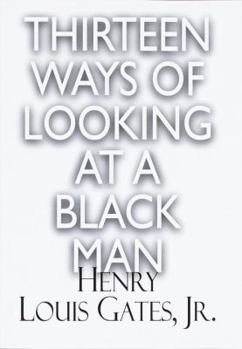Thirteen Ways of Looking at a Black Man
Select Format
Select Condition 
Book Overview
"This is a book of stories," writes Henry Louis Gates, "and all might be described as 'narratives of ascent.'" As some remarkable men talk about their lives, many perspectives on race and gender... This description may be from another edition of this product.
Format:Hardcover
Language:English
ISBN:0679457135
ISBN13:9780679457138
Release Date:January 1997
Publisher:Random House (NY)
Length:226 Pages
Weight:1.10 lbs.
Dimensions:1.0" x 6.4" x 9.6"
Customer Reviews
5 ratings
Masterful
Published by Thriftbooks.com User , 17 years ago
Gates is a master of his craft; his writing is original, insightful and is of the whole cloth-- weaving visual images with literary allusions and references to the person that render all of what we might rightly know of a visible self. The portraits are intellectually rich and intellectually satisfying. His rendition of the crack in Jesse Jackson's reaction to Colin Powell-- which only comes out in private, is absolutely magical and priceless for the emotional nuance it conveys (in a loving and hilarious style). Like an exquisite and rare gourmet meal for the mind, one wants these profiles never to end for the knowledge and reality that they impart.
A Fine Collection of Profiles
Published by Thriftbooks.com User , 20 years ago
Henry Louis Gates, Jr. masterfully profiles eight black men in this collection of his New Yorker essays. He writes in a bluesy, artistic style and has the ability to get quotes from these men that any other journalist would fail to do. The men intimately discuss the tragedies and successes of their lives. The stories of these men details their ascent and depicts the world around them. Gates daringly portrays O.J. Simpson and the infamous trial and Louis Farrakhan, the outspoken leader of the nation of Islam. The other men profiled are James Baldwin, Albert Murray, Bill T. Jones, Colin Powell, Harry Belafonte, and Anatole Broyard. Each of their lives have distinct differences, but it is also interesting to find the areas where they overlap. The portraits of Powell and Farrakhan stand out the most to me as Gates sheds light on the stories behind the men that we rarely see. I recommend this book for its intriguing stories, dynamic language, and true concepts of what it means to be a black man in America.
Couldn't put this one down, wonderful
Published by Thriftbooks.com User , 23 years ago
Henry Louis Gates must have some magical ability to transcribe someone's personality onto the printed page. I was amazed at the variety of personalities Gates wrote about and how accurately Gates seemed to portray them. My favorites were Anatole Broyard and Colin Powell, but every essay is compelling. Perhaps what I enjoyed most is that Gates had the bravery to write about controversial subjects (like Louis Farrakhan and O.J. Simpson, though an entire essay was not dedicated to the latter). I recommend this book highly. Fans of this book would also enjoy Cornel West's Race Matters.
Great Book
Published by Thriftbooks.com User , 25 years ago
I really enjoyed this book. Gates is a great writer and has a great ability to capture personalities on paper. I recommend this for anyone who thinks there is one type of black man.
The Ultimate Rejoinder
Published by Thriftbooks.com User , 25 years ago
One of Henry Louis Gates, Jr.'s stated goals is to expose the constant hovering shadow of racial identity that, unbidden and unspoken, lives beside us. In that venture he succeeds and, I suspect, most poignantly for Negroes. Yet as illuminating and cathartic as this book might be for the black psyche, it may be more so its white counterpart.Daily news and live encounters too often remind us, or me anyway, of the unsavory and resistant pathologies that blight our black communities, so that the actual potential of an entire people can seem in doubt. (Is it too much to ask that reality matches our desperately hopeful cant?) But Gates's talent alone refutes this notion; his prose flows so smoothly and cuts so deftly that I'd do the shopping and pay the bill, just to read his grocery list. And if Gates alone doesn't accomplish that, then the seven complex lives he splays on his pages certainly do.This happens not because of some strained attempt to rehabilitate an image. Rather, because he examines his subjects like the diamonds that they are, and unflinchingly rotates them to reveal both superb facets and fatal flaws wherever they arise. In doing so, any nagging questions of ability seem ridiculous, leaving cultural impediments as the villain in a national tragedy. Black excellence is the ultimate rejoinder.I grabbed this collection in a rush at the bookstore, and only later did I realize that I had read two of the chapters in The New Yorker. Most (all?) of them were first published there. Still, I don't regret it.




